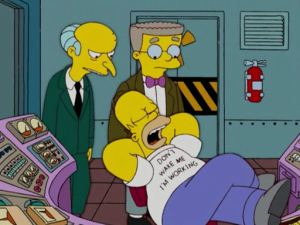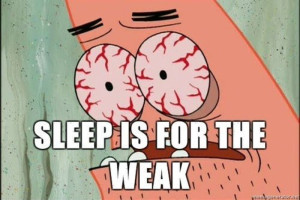Sleep and I have a love-hate relationship. I love to sleep, but I hate it when I oversleep. I love to be well-rested, but I hate when I have to go to sleep just as I begin to get some work done. May the reasons for my sleep issues lie with the traditional sleep cycle that I was taught as a child? Could there be a better way to sleep other than the singular 8-hour sleep that I’ve used all my life?
To start, there are three main types of sleep cycles: monophasic, biphasic, and polyphasic. Monophasic sleepers usually sleep between 7-9 hours a day during their one sleep. Biphasic sleepers usually sleep around 6-8 hours, having two 3-4 hour sleeps a day. Finally, and most controversially, polyphasic sleepers can, allegedly, sleep as little as 2-4 hours a day on certain sleep cycles that require several separate naps. Of course, you are probably wondering how such a promise could be kept. The theory about polyphasic sleep cycles is based on the idea that taking short naps can trick our brains into entering REM sleep faster than it would with one long sleep. REM sleep is the most important part of sleeping, so to reduce the other parts of sleep, we might be able to condense the entire process into a much shorter amount of time with no problems, in theory. This infographic from Dreams, a United Kingdom bed retailer and manufacturer, does a great job of spelling it all out but is too large to put in this blog.
The two most popular examples of polyphasic sleep cycles are the Uberman, a cycle that requires six 20-30 minute naps a day; and the Everyman, which requires one long “core” sleep along with 3-5 shorter naps a day. These two polyphasic cycles have been given quite of bite of attention online due to their promise of an increase in waking hours with no adverse side-effects, and if you go on Youtube and search for either you are sure to find videos documenting many peoples’ attempts to try and make these sleep cycles work. The key word is “attempts.” People who attempt to switch to a polyphasic sleep cycle often have a two week period of struggle known to the internet community as the “adaptation period.” Many, such as this poor bloke, fail to apply either the Uberman or the Everyman past this period and end up returning to monophasic.
Some, though, do make it through to the other side and these people could not be happier. This go-getter, whose YouTube channel is suitably called BeYourPotential, is just the type of motivated, young person who might want to make something like polyphasic sleep work. He did, in fact, make it work for thirty days, but eventually fell off the boat once he accidentally drank some caffeine and missed a nap, throwing off his entire sleep schedule. Many others online say that they made polyphasic sleep work for them, but could not continue due to the contrast between their schedules and the rest of the world. Even if polyphasic is more efficient, it certainly is not realistic.
But could a polyphasic sleep cycle be more natural for humans than monophasis or biphasic? Many animals are polyphasic, and even human babies sleep with a polyphasic cycle before they eventually conform to the rest of the world. But how could it be more natural when so many on the internet have such a difficult time adapting to it? Surely our bodies would be quicker to reform if our current monophasic cycles were really that bad for us. Scientist and researcher Thomas Wehr authored a paper on an experiment in which subjects were exposed to sixteen and ten hours of light a day. Wehr found that as the amount of light was reduced, subjects began to sleep in biphasic cycles with about one to three hours in between the sleeps. Could the true, natural sleep cycle for humans be the less controversial biphasic sleep cycle instead of the Uberman or the Everyman? Some Hispanic countries have even made biphasic sleep a part of their culture, incorporating a daily siesta after a mid-day meal. Interestingly, a resource from the Division of Sleep Medicine at Harvard Medical School tells us that “Afternoon naptime typically coincides with a brief lag in the body’s internal alerting signal.” This signal helps to offset the body’s drive for sleep, and its sudden drop off may be a sign from our body telling us that we need a rest.
Some people, known as short-sleepers, do not need and afternoon nap and barely even need sleep at all. According to Ying-Hui Fu, a professor at the University of California San Francisco School of Medicine, these short-sleepers need only about six hours a sleep a day and tend to be much more ambitious and energetic than the average person. A paper published in Science in 2009 by Fu revealed that people you are qualify as short-sleepers have a mutation in the gene known as DEC2 that makes them require less sleep than the rest of us. Making up about one-percent of the population, these super-humans could probably pull of polyphasic sleep better than the average person because of the decreased effects of sleep deprivation that they would experience. I’m pretty jealous.
The worst part about this is that we don’t really have a chance to try out the more complex sleep cycles because we, as college students, have hectic schedules that are constantly changing. When taking on something like the Uberman, one missed nap can completely ruin everything. Regardless, it is known that a large number of the world’s greatest geniuses have tried polyphasic sleep at one time or another. Somehow the likes of Nikola Tesla and Leonardo Da Vinci made such rigorous schedules work for them. Just know that before you try any of this for yourself, you should talk to your doctor about the risks and dangers that sleep deprivation can cause to you. If you are not in peak physical condition there is a large chance that the consequences may be much worse than being a little sleepy. Stay safe, and thanks for reading.



I knew I would be intrigued by this article as soon as I read the world “sleep”. I do find it very interesting that there are numerous different sleep patterns that are found in our world. I remember hearing years ago that our bodies sleep in cycles of four– that we’re better off sleeping for 4 hours rather than 5 or 6 because we will be waking ourselves in the middle of a deep sleep, rather than at the end of a 4 hour period. I’ve always found this strange, but lately I’ve found myself waking up after exactly eight hours of sleep. No matter what time I go to bed, I ned exactly eight hours. If I am to wake up after only six or seven, I am grump and inactive and inattentive for the remainder of the day, however there have been days I’ve slept four hours and felt completely fine throughout the day. Furthermore, I’ve come to the realization that if I have the options of sleeping only two hours or not sleeping at all, I’m better off not sleeping and getting all my obligations done, then taking a nap later on. Enough about me though…
I love how you incorporated the idea of *trying* to adjust to a different sleep schedule. I presume it is kind of like jet-lag— your body is just taken off-guard by the changes. But what I also feel is important is what kind of lifestyles these people lives. I believe that the sleep cycle of a nurse who works 24 hours straight would be different from that of a teacher. Furthermore, the sleep schedule of a student may be very different from that of a security guard. The lifestyle of these people plays a direct role in the sleep schedule, but so does the stress that comes from each occupation. Often times, stress has a direct impact on sleep, as mentioned here. This website specifically states that teens are not getting the required sleep, often due to stress. The overload of work of a college student makes them unable to get necessary sleep, causing them to often rely on naps. I think this study would greatly benefit from analyzing the sleeping patterns of those who hold different lifestyles and stress levels and how the compare with one another. Also, maybe diet and exercise as well as caffein intake could be monitored if an actual study was to be conducted.